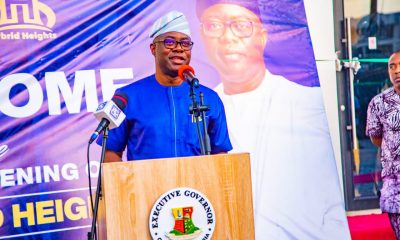Opinion
As Makinde leapfrogs Oyo’s economic growth with agribusiness
By Sulaimon Olanrewaju

Albert Einstein gave the world one of the most profound insights into solving problems. According to Einstein, who is regarded as the most influential scientist of the 20th century, a problem cannot be solved at the same level of consciousness (thinking) that created it. The import of this is that every situation or problem is the outcome of a thinking process; and without a deliberate effort to raise the thinking that gave rise to the problem, the problem will persist.
Einstein’s postulation is hinged on the fact that thinking is action’s precursor. As a matter of fact, thinking determines actions. Unless the thinking changes, action does not change. If action does not change, outcome remains the same. To overcome a problem, a new thinking, which is not in consonance with the dominant thinking, is required. This is why great leaders daily engage in focused, creative and strategic thinking to overcome various societal challenges and improve the state of their people.
Thinking is the lot of leaders because problem solving is their calling. The quality of a leader’s thinking is directly proportional to the progress recorded in his time; it is also directly proportional to the quality of the people’s lives. If a society is making progress, it is because the leaders are thinking right and doing the right things. Ditto, a retrogressive society is an indictment on the quality of thinking the leadership engages in. The prosperity of a society is a consequence of the robustness of the leaders’ thinking process; similarly the poverty of a people is a reflection of the malnourishment of their leaders’ thinking.
When Governor ‘Seyi Makinde assumed office in 2019, Oyo State was not numbered among Nigeria’s prosperous sub-nationals. It was categorized as an agrarian and civil service state. At that time, the state only managed to generate N1.8bn internally, and depended largely on revenue from FAAC for its sustenance. Consequently, unemployment rate in the state was high and so was poverty rate.
Makinde knew that for the narrative of the state to change, the thinking had to change. He knew that a type of thinking had limited the state’s IGR to N1.8bn monthly but a new thinking could take it much higher. He knew that a thinking had tethered the state’s productivity but another thinking could unleash it. He knew that the state had (and still has) comparative advantage in agriculture but its capacity had been limited by the dominant thinking of the time. Makinde knew that the state’s comparative advantage in agriculture had to be turned into a competitive advantage and deployed to create wealth for the people. He knew that to make the most of the state’s comparative advantage in agriculture, he had to think about agriculture beyond sustenance. So, to optimize the benefits inherent in agriculture, Makinde came up with a strategy that would make the Ministry of Agriculture focus on providing smallholder farmers with all the support they required to ensure food security and went ahead to establish the Oyo State Agribusiness Development Agency (OYSADA) as a vehicle for wealth creation. OYSADA’s mandate is to create an enabling environment for agribusinesses to thrive by supporting infrastructure development and policy formulation.
Agribusiness is novel in Nigeria. Agribusiness is the system of migrating agriculture from being treated as a social service to being viewed as a business engagement that harnesses available potentials and opportunities for wealth creation. The difference between agriculture and agribusiness is best explained by the difference between the average Nigerian farmer and the average American farmer. While the average Nigerian farmer is struggling and shriveling, the average American farmer is thriving and flourishing. When agriculture is handled as a social service, poverty is multiplied, but when treated as a business, prosperity is created. The edge of agribusiness is that with it there is guaranteed uptake for smallholder farmers, guaranteed employment opportunities for the citizens, guaranteed revenue for the government, and guaranteed development for the state. So, with agribusiness, everyone gains.
When Makinde introduced agribusiness in Oyo State, it was the first time any Nigerian sub-national would travel that route. So, not unexpectedly, tongues wagged about the viability of the venture. Some people said the state was better off treating agriculture as a social service rather than as a business. Some people were of the opinion that the state should have invested in growing crops instead of promoting agribusiness. But despite the criticisms, Makinde stuck to his gun by promoting agribusiness in the state.
Why?
A leader is one because he sees farther than others. A leader is a change agent because he sees opportunities before they become obvious; he is also able to identify threats ahead of others. So, great leaders always champion changes targeted at improving the lot of their people. Progress cannot be recorded without change being effected. Though, oftentimes people resist changes, the leader is insistent because he knows that the desired destination would remain a delusion unless change is pursued to a logical conclusion. Makinde insisted on agribusiness because he had seen the embedded opportunities before they became obvious to others.
Makinde is of the view that the high rate of poverty in Africa is traceable to the inability of the continent to turn agriculture, which is the predominant engagement of the people, into a business. By failing to treat agriculture as a business, the continent overlooks the agricultural value chain. Consequently, limited opportunities are created, limited jobs are generated and minimal wealth is produced. The end product is increasing poverty.
Corroborating Makinde’s view about agriculture and agribusiness, Dr Akinwumi Adesina, President of African Development Bank (AfDB), said: “Agriculture is not a way of life. It is not a social sector or a development activity, despite what people may claim. Agriculture is a business. And the more we treat it as a business, as a way to create wealth, the more it will promote development and improve people’s lives to boot.”
The former Nigerian Minister of Agriculture added, “One way to treat agriculture like a business is to get the private sector more involved in it. When I was Nigeria’s Minister of Agriculture, the most important thing I had to understand was that government can’t create agricultural transformation; it can only enable it by making more room for businesses to intervene. We could do this by putting the right policies and regulations in place, by creating strong institutions, and by building sufficient infrastructure. But there is not much else government can do with a reasonable measure of efficiency. Agricultural transformation has to be led by the private sector.”
The major pull for private sector investment in any sector is the provision of required infrastructure. So, as a way of attracting private capital to the agribusiness sector in the state, Governor Makinde, right from the outset, saddled OYSADA with the responsibility of turning the various farm settlements in the state to industrial hubs. OYSADA was asked to turn these abandoned facilities into world-class business environments for the purpose of attracting investors from across the globe.
The first of the farm settlements to be turned into an industrial hub was Fasola. By providing the necessary infrastructure and emplacing policies that enhance business performance, the erstwhile moribund farm settlement has become a business cluster of sort with national and multinational companies occupying the 1,000-hectare facility.
By providing the necessary infrastructure at Fasola and improving the road network around that axis and other parts of the state, the Seyi Makinde-led administration has attracted development funds in excess of $120 million and about N150 billion worth of investments. Similarly, many companies have sprung up within the Fasola Industrial Hub as well as the other parts of the state. These include Psaltery, the first company of its kind in Africa, which processes cassava products into sorbitol; Rontol Farms in Ilora, which also processes cassava and the Oyo Sugarcane Processors Ltd, the first brown sugar processing company in Nigeria, Brent Farms Ethanol Processing Company and Niji Agro-Solutions.
Within Fasola Industrial Hub, there are eight national and multinational companies. Some of these are FrieslandCampina WAMCO, Milkin Barn Agro Services Ltd, E4 Farms, Brownhill Farms, Zigma Ltd and GOSEED Vegetative Ltd. Together, these companies have created thousands of employment opportunities, supported thousands of smallholder farmers and generated revenue for the state.
In just over five years, the agribusiness sector has attracted over a dozen major companies into the state. If any administration before 2019 was able to attract as many companies into the state, I would like to have the list.
With Fasola Industrial Hub completed and fully occupied and the state government already leveraging the experience garnered from the project to turn the moribund 3,250-hectare Eruwa Farm Settlement into an agribusiness industrial hub, sustainable development in Oyo State is closer than ever.
Dr. Olanrewaju is the Chief Press Secretary to Oyo State Governor





















